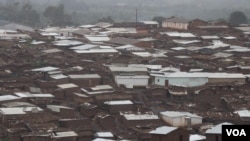An international rights group is asking the Malawi government to stop the forced relocation of 8,000 refugees living outside a congested camp.
Human Rights Watch says it is concerned by reports that children are among those caught up in the sweeps and forcibly taken to a prison in the capital, Lilongwe. The rights group says the forcible relocation violates international conventions for refugees which Malawi ratified.
Idriss Ali Nassah, who is with Human Rights Watch covering Malawi, Zambia and Zimbabwe, told VOA the relocation of refugees is troubling.
"There are reports of this raid being carried out by military men and the police, who are arresting indiscriminately women, children and the elderly and taking them first of all to Maula maximum security prison in Lilongwe," he said. "Not only are the authorities committing abuses during arrests and detaining children, but forcibly removing people from their homes amounts to unlawful forced evictions."
Nassah said his organization has learned that 20 refugees and asylum-seekers at Maula Prison and Dzaleka refugee camp were allegedly assaulted during raids and that their money was taken.
Last week, Malawi police arrested two police officers for soliciting money from seven refugees from Burundi to spare them from forcible evictions.
Malawi started the forcible relocation last month following the expiration of the April 15 deadline the government gave the refugees to voluntarily relocate to the camp.
The government said by staying outside the camp, the refugees threaten national security. In addition, the encampment policy prohibits refugees from staying outside the camp.
Nassah said the policy contradicts agreements that the Malawi government ratified.
"But this is contrary to what Malawi itself endorsed in 2018 when it endorsed a Global Compact on Refugees, which seeks to include and integrate refugees into host communities," he said. "Because by doing that, you allow refugees to become self-reliant if they are permitted to have access to education, labor market, access to entrepreneurship, and they contribute to the development of host communities and local economies."
Dzaleka, the only refugee camp in Malawi, was meant to house 12,000 refugees and asylum-seekers, according to UNHCR. Instead, the camp holds more than 50,000 refugees from the Democratic Republic of Congo, Burundi, Rwanda, Somalia and Ethiopia.
Several rights groups in Malawi and abroad, including the U.N. refugee agency, have asked Malawi to stop the relocations due to the congestion.
Patrick Botha, spokesperson for the Ministry of Homeland Security in Malawi, told VOA that the refugees outside the camp have long posed a security threat and need to be confined to the camp.
"The position of the Malawi government is that this is a necessary exercise," he said. "Actually, you have seen that some of the people we are talking about have been found with illegal documentation in South Africa — the case of this Rwandese who is suspected to be a mastermind of the genocide."
Botha said the recent arrest of a Rwandese national in South Africa who was allegedly using a Malawian passport has fueled the Malawi government to intensify relocation efforts.
However, Botha said refugees that are kept in a prison are not subjected to prison conditions.
"We are using Maula premises not as a way of imprisoning them. Actually, we are using the Maula premises as the center for screening," he said. "So, depending on what comes out of the documentation — they are either ... sent back home, if they have legitimate papers of documentation."
Nearly 2,000 refugees have relocated to the Dzaleka camp, where some refugees have told VOA they are living under dehumanizing conditions with no food, running water and shelter.
The World Food Program told VOA that the relocation exercise adds pressure on its already strained food assistance for Dzaleka camp refugees.




